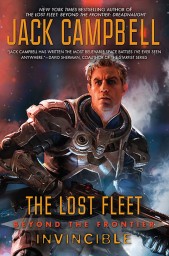Science Fiction is the genre of big ideas, but the truth is that the man with the literary or intellectual ability to capture a big idea in fiction is rare. Fortunately, genre fiction has developed some templates for the “honest workman” author.
A human being dedicated to form who is productive with his stories can delight and entertain–if not as deeply, just as broadly, or moreso–readers around the world. And there are plenty of good books being written today that fit that description:

E.E. Knight’s Vampire Alien Invasion Military SciFi
Spinward Fringe: Imperial Space Opera
There is great room for honest, adventurous pulp in science fiction, not because it developed as a separate path within the genre but because the fringe “big idea” pushers have been engineering magnificent, if at times forgotten, experiments (not always successful ones, either) all along the way.
Great minds do not always produce the most common works. Nikola Tesla, who appears at least later in life to have been as imaginative with his stories as he was with practical and repeatable experiments (for example: the infamous if now somewhat passe “death ray” trope in science fiction? Yeah, that was Tesla. He claimed to have one nearly completed that would end all wars. Trouble was, he left no equipment or documentation to back up the claim) stands in contrast to Thomas Edison, the master of templates.
Certainly, there is some (and sometimes great) tension between creators of “big idea” science fiction and those more interested in following through with a series of “ripping good yarns.” Also, there are those extremely rare authors who are capable of doing both. But the real problem with this structure of authorial viewpoint is in the void: just as it was extremely easy for Edison to strike the public pose of brilliant technological genius, the “big idea” genre tempts both the “honest workman” author and the common charlatan to attempt to pass for literary genius.
Thus, an author with an Edison complex, especially one willing to shortcut the reader can publish common books, or even books that are shelved in the wrong genre, but because they’ve leveraged accolades, awards, or just good old-fashioned public relations in their favor, they can create the illusion of significance. This is why the lament “There just isn’t anything out there” is so common. It is easy for pretenders to cloud the reader’s perception.
So, look for Tesla (or Servetus, or Swedenborg or PKD) when you want the big idea. Look for the “honest workman” when you want the rollick. Avoid the author with the aspirations and positioning of Edison if you want to be spared the headache.
Wouldn’t you say there’s a spectrum in between the big idea and honest workman, where authors who are reaching for big ideas toil away? There are all kinds of non genius, yet still intelligent and imaginative people who seek an outlet through writing. I would even say that most of our historically memorable literature was written by that kind of person.
Yes, I would say there’s a spectrum. I would also say that territory also provides the most opportunity for the charlatan.
I’m thinking about this but it’s difficult, as thinking is, generally. How does one tell a charlatan from somebody who really wants to be a big idea person but just doesn’t got it? At this point, I would be a charlatan if I knew how. I might make some money.
Bingo, although for now let’s you and me maintain our sense of honor until circumstances prove us wrong. However, from a reader’s perspective, not a writer’s perspective, it is important to use some clues to identify whether you are being Edisoned, Teslad, or Simply Swindled ahead of time.
Now, there is a fairly prominent book series by a long-time semi-Tesla that has gone off the rails. A lot of fans feel justifiably disappointed in the latter-day output. Had fans paid attention to the author’s chronological age and health habits, they would have realized that he was practically doomed to decline rapidly mid-masterpiece. The real Tesla did the same.
He is no charlatan: merely too elderly to sustain massive storylines. Same thing happened to Tolkien, fortunately after his most important work.
But there are other men who brag about their methods and ambitions in public. They basically tell the reader that his job is to be victimized. I used to believe that I was noble and earnest for judging a book on its content, not on its author. In some cases, this approach didn’t harm me. In others, it got me into a book or series that I could have known in advance would not deliver.
I am looking to be entertained. If you succeed in being entertaining, I will be happy with the money I spent on your book, and buy more. If you are entertaining with big ideas or well told formulaic pieces does not matte to me. If you preach at me rather than entertain me, I won’t buy any more books. If you entertain me, I can endure a little preaching (Terry Goodkinds Sword of Truth…..up to about volume 6, was entertaining, then preachy. After 6, it was preachy, then entertaining. Then he lost it about number 8, and lost me shortly thereafter.)
As the Grandmaster said, you are competing for my beer money…..and BEER is GOOD. You have to be better.
